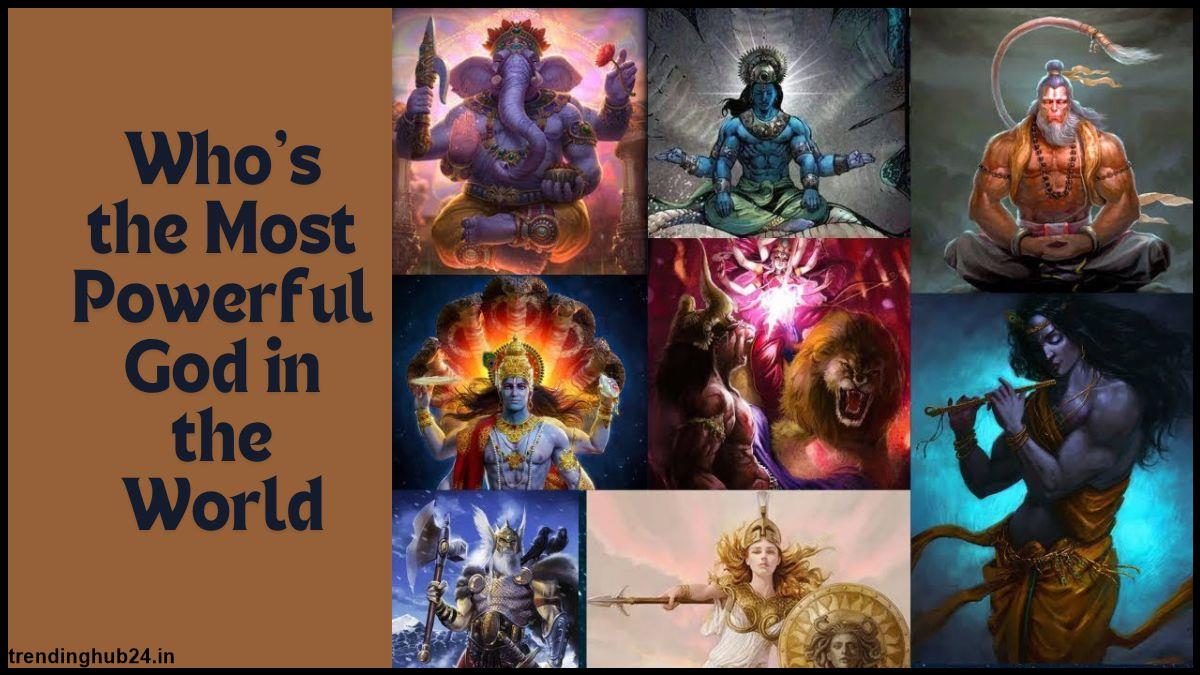🚀 Become a Verified Author on Trending Hub24
✍️ Author Account Available @ $60 / Month | +91 7355993756
Who's the Most Powerful God in the World

The question of who is the most powerful god in the world or which god is most powerful in the world is a subject of fierce discussion and translation.
Table of Contents
Who's the Most Powerful God in the World? A Profound Jump into Divine Power Across Cultures
All through human history, gods and deities have been idolized as images of force, intelligence, and authentic power. Across brilliant influences and social orders, various gods are praised for their unparalleled limits and impact. In any case, this brings us to a fascinating question: Who is the most powerful god in the world? In this post, we'll explore the origination of faithful power, analyze significant divine beings from various social orders, and quibble how every custom responds to the question "Which god is most powerful in the world?"
Understanding the Concept of Divine Power
To understand "who the most powerful god in the world" may be, we first need to characterize what it means for the deity to be powerful "powerful." Divine power is often connected with credits such as creation, obliteration, feeling (all-knowing), and supremacy (all-powerful). A divine being's influence might be estimated by their capacity to control regular fundamentals, apply extraordinary powers, or guide mortal fortune. In any case, this idea of force can shift fundamentally across various influences and legends.
Which God is the Most Powerful in the world
Each culture has its own pantheon of gods, each with its unique attributes and domains. Here are some of the most powerful gods from different religions
- Greek Mythology: Zeus
In Greek mythology, "Zeus" is viewed as the king of the gods, administering over Mount Olympus and applying enormous power. Zeus is known for his command over the sky and roar, as well as his power over both god and people. As the lord of equity, Zeus keeps everything under control in the world and is habitually portrayed as a significant and directing figure who rebuffs the people who challenge him. His power lies in his solidarity as well as in his insight and ability to make crucial conclusions influencing the world.
- Norse Mythology: Odin
In Norse mythology, Odin is viewed as the All-Father and the main god. Odin is related to wisdom, war, demise, and magic. He's known for sacrificing one of his eyes in return for cosmic information and hanging himself on the World Tree, Yggdrasil, to acquire authority over the runes (magical symbols). Odin's power is derived from his wisdom, his ability to see into the future, and his part as the head of the divine beings and security of the nine domains.
- Christianity God (Yahweh)
In Christianity, God also related to Yahweh, is viewed as the one valid and all-powerful deity. Not at all like different influences with numerous gods, Christianity is monotheistic, stressing that there's just a single God who's the maker of everything. God's power is horizonless, including creation, obliteration, benevolence, and omnipresence. His hunch and ubiquity (being everywhere at all times) further emphasize His unrivaled power, making him the preeminent divinity in Christian religious philosophy.
- Islam Allah
In Islam, Allah is the one genuine God, the maker and sustainer of the cosmos. Allah is all-powerful, human, and widespread, holding absolute authority over all creation. The origination of authentic power in Islam is profoundly entwined with the possibility of monotheism (Tawhid), where Allah's power is special, indivisible, and past human appreciation. Allah's power is obvious in each part of reality, from the most minimal flyspeck to the tremendousness of the universe.
The most Powerful God in Hindu
While considering "the powerful god in the world Hindu", we track down a rich shade of divinities, each with extraordinary characteristics and powers. Hinduism is a polytheistic religion with an alternate pantheon of divine beings and goddesses, yet several are considered as the most significant.
- Lord Shiva: The Destroyer and Transformer
Lord Shiva is one of the top deities in Hinduism, known as the "Destroyer" inside the Hindu Trinity (Trimurti) close by Brahma (the Creator) and Vishnu (the Preserver). Shiva's power is immense, as he addresses the pattern of creation, protection, and destruction He's oftentimes portrayed with a third eye, emblematising his capacity to see past the normal and obliterate obliviousness and wrong. Shiva's cotillion, the Tandava, is said to connote the infinite patterns of creation and obliteration, life, and passing. Various Hindus see Shiva as the main god because of his part in both destruction and regeneration.
- Lord Vishnu, The Preserver and Protection
Lord Vishnu is another principal deity in Hinduism, known as the "Preserver" who keeps the control and harmony of the universe. Vishnu is accepted to manifest in various forms (avatars), such as Rama and Krishna, to re-establish enormous equilibrium at whatever point it's floated by malicious powers. Vishnu's power lies in his capacity to cover the world and safeguard its continuous fact, making him a focal figure in Hindu exaltation. For various Hindus, Vishnu is viewed as the most powerful god because of his part in keeping universal order.
- Goddess Durga: The Warrior Goddess
Goddess Durga is quite possibly the most blessed goddess in Hinduism, addressing womanlike power, or Shakti. Durga is a legionnaire goddess who typifies strength, security, and savage empathy. She's oftentimes portrayed riding a lion or tiger, applying various weapons, and rubbing out evil presences that hang the enormous request. Durga's power is unparalleled when it comes to defeating evil and protecting righteousness, making her one of the most powerful god in hindu religion.
Debating the Most Powerful God in the World
The question of who is the most powerful god in the world or which god is most powerful in the world is a subject of fierce discussion and translation. Each culture and religion has its own depiction of genuine power, molded by exacting, imaginative, and profound encompasses. For some's purposes, the force of a god might be estimated by their capacity to create or obliterate, while for other people, it could be their wisdom, sympathy, or equity.
Final Words
The topic of "Who is the most powerful god in the world ?" is one that may never have a conclusive response. It changes starting with one conviction framework, then onto the next, formed by creative, exacting, and profound encompasses. What stays amicable is the love and regard for these gods' order and the significant effect they've on the existence of their adherents. Understanding these divinities permits us to see the value in the wide variety of mortal convictions and the general chase after importance and authentic association.

